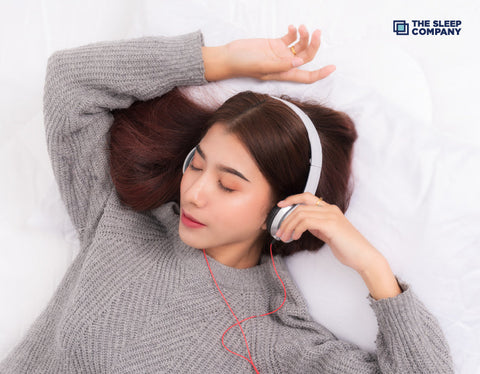My Cart

How to Sleep without Snoring?

Are you annoyed of hearing about how loud your snoring is? Snoring is a raspy or harsh sound produced by air passing through relaxed tissues in the throat, causing the tissues to vibrate while you breathe. Snoring is something that almost everyone does from time to time, but for some people, it can become a persistent problem. As we inhale and exhale, the moving air causes the tissue to flutter and produce noise like a flag in a breeze, which narrows the airway as we sleep. It might also be a sign of a major health problem. Furthermore, snoring can be a bother to your companion.
Health Survey conducted in India states shocking facts that around 22.0% of the total Population self-reported having Snoring Disorder in the country. Coming to the statistics in numbers it is estimated around 51,344 are the victims of Snoring Disorder in India. When their partner complains about their snoring, people often reflect on their sleeping habits and wonder if their snoring is indicative of a broader health problem.
What are the causes of Snoring?

Certain people are more prone to snoring because of the size and form of the muscles and tissues in their necks. Snoring can also be caused by excessive tissue relaxation or a constriction of the airway. The following are some examples of risk factors that contribute to an increased risk of snoring:
- Obesity
- Drinking Alcohol
- Medications that cause drowsiness
- Nasal congestion that persists
- Tonsils, tongue, or soft palate that are large
- Nasal polyps or a deviated septum
Relation between Snoring and Sleep

Snoring is often associated with a sleep disorder called obstructive sleep apnea (OSA). Snoring One of the most common questions posed by people who are just learning they may have sleep apnea is how to sleep without snoring? Obstructive sleep apnea (OSA) is a condition in which breathing is restricted during sleep, resulting in pauses and deficits in breathing, which commonly result in snoring.
Not all snorers have OSA, but if your snoring is accompanied by any of the following symptoms, you should consult a doctor for an OSA evaluation:
- Excessive daytime sleepiness Breathing pauses observed during sleep
- Concentration problems
- Headaches in the morning
- When you wake up, you have a sore throat
- Sleepless nights
- At night, you may find yourself gasping or coughing
- Blood pressure that is too high
- Night-time chest ache
- Your snoring is so loud that it’s disturbing your partner’s sleep
- In children, poor attention span, behavioral issues, or poor academic performance are all possible causes.
If you’re worried about snoring, see if you have any of these other symptoms as well. If not sleep apnea, you could be suffering from one of the numerous other causes of snoring. You may snore as a result of bad sleeping posture or simply aging. As we age, the muscle tone in our throat that keeps our airways open decreases.
Easy Solutions to Stop Snoring

The type of treatment depends on the severity of the snoring and the problems it causes. Treatment may not be necessary for persons with infrequent or main snoring unless it is disrupting their sleep or the sleep of someone they live with. Treatments are usually easier and less invasive in these circumstances. People who suffer from sleep apnea frequently require more intensive treatment. Consider these easy solutions to stop snoring –
1. Lifestyle Adjustments
Changes in your lifestyle, as well as other factors, can help you stop snoring. Lifestyle modifications can help you reduce snoring. Lifestyle adjustments are frequently recommended even when other therapies are offered.
2. Maintaining a healthy weight
Because being overweight or obese is a major risk factor for snoring and sleep apnea, maintaining a healthy weight might be a crucial step in preventing snoring.
3. Limiting alcohol and sedative use
Alcohol is a common cause of snoring, and sedative drugs can also cause it. Consider cutting back if you consistently have more than three or four drinks. While alcohol can assist us in falling asleep, it also has the potential to harm us. Smoking also irritates the throat, causing snoring.
4. Changing your sleeping position
Sleeping on your back allows your airway to become clogged more easily. It may take some time to adjust to a new position, but it can be beneficial.
5. Adjustable Bed
Using an adjustable bed to raise the top part of your bed may help you stop snoring. It’s crucial to lift the entire mattress rather than just adding more pillows for this to work. The Anti-snore position of the Smart Adjustable bed allows sleeping with an inclined head angle that helps reduce snoring and improve your blood circulation.
6. Comfortable Pillows
Snoring occurs due to the narrowing or obstruction of a person’s airway. A pillow can help reduce snoring by aligning the head and neck in a way that opens the airways. A number of pillows are available that could help reduce snoring.
Try Smart Cervical Pillow, ergonomically designed to give your head, neck, and shoulders maximum support and helps to relieve head pressure and stress.
7. Mouthpieces that prevent snoring

An anti-snoring mouthpiece keeps your tongue or jaw in a stable position as you sleep, preventing it from blocking your airway. Anti-snoring mouthpieces are divided into two categories.
You’re not alone if you snore. Snoring can impair both your and your partner’s sleep. It can be bothersome, but it could also be a sign of a significant health problem. Connecting with a doctor and attempting one or more of the therapy methods can assist you in better managing your sleep.
FAQs
To sleep without snoring, try sleeping on your side instead of your back and keep your head slightly elevated to open your airways. Avoid alcohol before bedtime, stay well-hydrated, and maintain a consistent sleep schedule. Keeping your nasal passages clear with a humidifier or nasal spray can also help. If snoring persists, consult a doctor to rule out conditions like sleep apnea.
Sleeping next to someone who snores can be challenging, but there are ways to manage it. Try using earplugs or a white noise machine to mask the sound. Encouraging your partner to sleep on their side can also help reduce snoring. Additionally, practicing relaxation techniques like deep breathing can make it easier for you to fall asleep.
Sleeping without a pillow can reduce snoring for some people, especially those who sleep on their back. Using a thick or high pillow may tilt the head forward and obstruct the airway, which can worsen snoring. Sleeping without a pillow may help keep the airway more open and reduce snoring, particularly if the person sleeps on their side or stomach. However, the effect can vary depending on the individual's sleeping posture and underlying causes of snoring.






























































